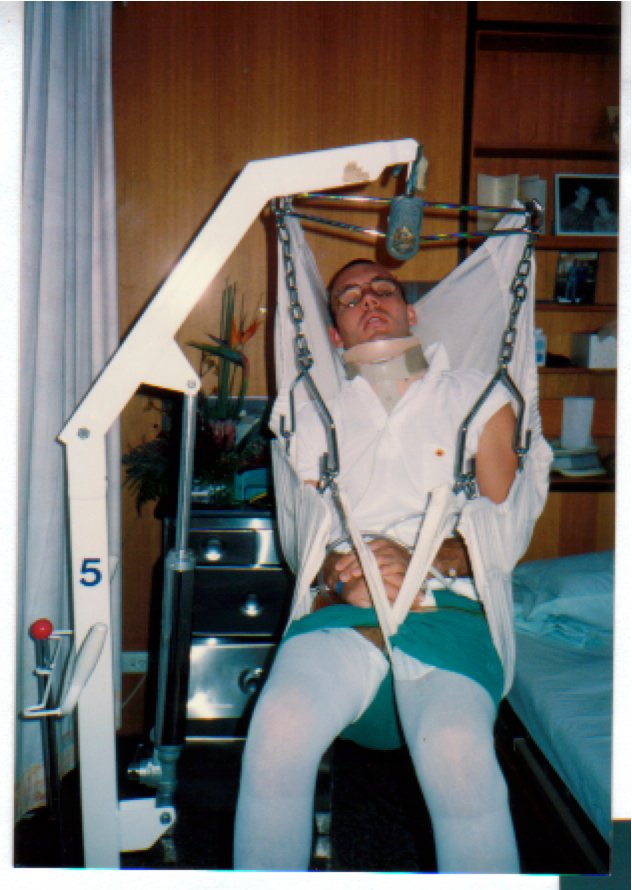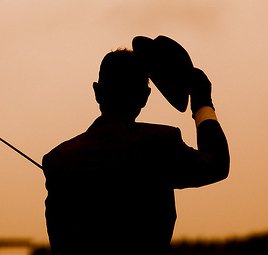Princess Alexandra Hospital and the struggle for a new life
Princess Alexandra Hospital
My parents had accompanied me on the flight from Cairns and were by my bedside for the first few weeks of my stay in hospital. In the days that followed my accident my parents took control of everything and were constantly by my side, but in all this Jenny was overlooked. Jenny came to Brisbane a week after my accident, but could only stay for a few days, she had to return home to sort out our affairs before she could return to Brisbane for the period of my rehabilitation.
December is usually a busy month in the spinal unit, as the coming of summer usually brings with it a spree of injuries from diving related accidents. The Spinal Injuries Unit at Princess Alexandra Hospital was certainly kept busy during the month of December 1991. To some extent it eased my pain and made me feel less alone to see others suffering at the same time. A young American by the name of Mike Knepler had the misfortune of suffering an injury like mine and was admitted to the spinal unit the same day that I was. His injury was almost identical to mine and so was his resulting level of disability. In those first few days after the accident seeing someone else as terrified and frightened as I was certainly seemed to help. I guess it is like the experience prisoners of war go through when they have to endure great suffering. Certainly, a fair degree of camaraderie developed between the young American and myself. Through the tears and the misery, we managed to gather strength from each other.
During the first few weeks of rehab, patients remain in the ‘acute care’. In that time, I had many cards and letters from well-wishers, as well as many visitors. It was a few days after my accident when my sister Joanne was called to the nurse’s station to answer a phone call. "Look, who is this really?" I heard her say in an angry voice. Then her tone changed, and she walked over to my bed. " Robert," she said, "Bob Hawke's on the phone and he wants to tell you his thoughts are with you, and to feel free to call him when you are feeling up to it." Things like that picked up my spirits a lot, but it was the letters I received from people back home that lifted my spirits the most, some were from people who I had not heard from since school, some from people I hardly knew, and some were from friends of dad. There were a couple of letters from people in wheelchairs, telling me not to give up, and that life goes on. These letters gave me a lot of encouragement. To this day I regret not attempting to reply to all the people who sent letters and cards, but maybe they will read this story, if they do I would like to give them my sincere thanks.
Jenny had arranged a meeting with two social workers from Australia Post and thanks to their excellent work and the compassion of other people at Australia Post Jenny received a temporary transfer to the South Brisbane Mail Centre which was only 5 minutes from hospital.
During the first few weeks after my accident I was permanently in a horizontal position. The doctors and the physio had explained to me what muscles I had lose and which I retained the use of. Gone were all my chest muscles and everything below. I retained my biceps and wrist extension, but gone were my triceps and wrist flexion. For the life of me I could not see how I could push a wheelchair without chest or triceps muscles, but others seemed to manage it. The fact I accepted my injury early on, meant that the grief associated with my loss hit me all at once. Accepting the fact you will never walk again and coming to terms with it, are two very different things.
Unfortunately, this reality does not quite satisfy societies need for inspirational stories of the triumph of the human spirit over physical adversity, nor does it satisfy the need of the tabloid media for sensational stories of a tragic victim who overcomes the odds. How often have we heard the tale of the brave individual who refuses to listen when the doctors tell him he will never walk again, only to defy the odds with a hardy combination of blood, sweat and tears. So many stories and so much folk-law have been built on this storyline which has absolutely no basis in fact. In almost every case of spinal cord injury, no matter how serious, a patient is never told he will never walk again. This is done for two reasons, firstly doctors want to give people time to get over the initial shock and slowly come to terms which what has happened and secondly, to let the swelling around the spinal cord go down, just in case some of the cord remains intact, and capable of passing messages down to the rest of the body.
Much of the mythology surrounding spinal cord injury has occurred as a result of what are known as ‘incomplete injuries’. An incomplete injury occurs when the injury is not severe enough to completely block the passage of messages to the lower part of the body. Typically, individuals who suffer this type of injury either end up in a wheelchair with minimal movement in their lower limbs, or less frequently actually manage to walk again, but do so with great difficulty due to partial paralysis. There are very few complete recoveries.
To be rehabilitated you must come to terms with your disability. Some people never do! While in Brisbane I met several people who, over twelve months after their injury, still spent at least some time during the day trying to get paralysed limbs to move. As if by sheer will, they could overcome an injury which was permanent and for which there was no cure. The best way I have found to explain the nature of the relationship between one’s mind and one’s paralysed limbs is by using the metaphor of a light-switch and a light. Once the electrical wiring is severed, it does not matter how much you want the light to turn on, or how many times you hit the switch, nothing is going to happen.
The number of miracle stories I have heard over the last 30 years have been too numerous to mention. These stories place a considerable burden on people with disabilities. If it were true that people with spinal cord injuries could walk again through sheer will power, what implications does this have for people with permanent disabilities? Are these the people who simply quit with no guts and no glory? This is too much of a burden to place on the shoulders of people who already have too much to cope with. The only truth post injury is that people will do whatever they can, not whatever they want, and they leave hospital that way, whether its walking, crawling, or in a wheelchair!

how did the accident happened? why specially in December more spinal problems? may be due to clod weather...

sorry to know the sad insident.
i appreciat your your sperit of life. you are grate